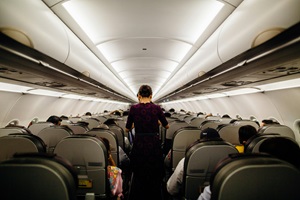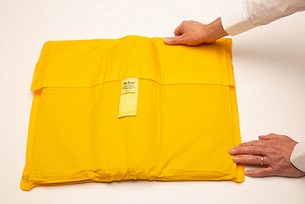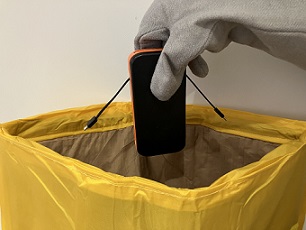 The confined space of an aircraft passenger cabin is the last place you’d want a lithium battery to go into thermal runaway
The confined space of an aircraft passenger cabin is the last place you’d want a lithium battery to go into thermal runaway
 An AvSax lithium battery fire mitigation bag which won the Queen’s Award for Enterprise in the UK
An AvSax lithium battery fire mitigation bag which won the Queen’s Award for Enterprise in the UK
 An overheating power bank being placed inside an AvSax ‘burnbag’
An overheating power bank being placed inside an AvSax ‘burnbag’
The number of lithium battery incidents on aircraft in the USA is now running at well over one a week.
The figures for 2024 have been finalised and show there were 73 throughout the year – slightly down on last year’s 78 and 75 in 2022 but well up on 54 in 2021. Most happened on passenger planes.
These are only incidents in US airspace or on American aircraft as the figures have been collated by the Federal Aviation Administration (FAA) in the USA. Other countries simply don’t provide any information on the number of lithium battery incidents – including the Civil Aviation Authority in the UK – so it’s impossible to know the full extent of the danger worldwide.
The FAA has been collating figures since March 2006 and has recorded 583 verified lithium battery incidents so far with a further eight pending verification.
But it stresses the list is not exhaustive and other incidents may have happened which have not been reported to them.
The FAA states: “These are verified lithium battery related events involving smoke, fire or extreme heat that the FAA is aware of and should not be considered a complete listing of all such incidents.”
The most hazardous devices are battery power packs which accounted for 230 of the FAA figures, followed by e-cigarettes and vapes which were responsible for 123. Mobile phones came third with 83 while laptops were responsible for 72 incidents.
When lithium batteries overheat or are damaged they go into thermal runaway and when this happens one cell in a battery overheats it can produce enough heat – up to 900°C (1652°F) – to cause adjacent cells to overheat.
The heat generated by chemical reactions inside the battery causes even more heat, leading to a continuous rise in temperature. This can result in the battery venting and releasing toxic flammable gases, exploding or catching fire and, because they burn at such a high temperature, they are very difficult to put out.
This is why more than 100 airline companies worldwide now carry around 17,000 AvSax lithium battery fire mitigation bags on board to deal with these emergencies quickly, stifling the fire and toxic smoke.
The AvSax won the Queen’s Award for Enterprise in the UK for its innovation - the highest accolade any business can achieve - and every time an AvSax has been deployed the aircraft has been able to continue to its final destination, saving the need for costly and highly disruptive diversions and emergency landings.
AvSax were devised by Richard Bailey, managing director of AvSax parent company Environmental Defence Systems based in Yorkshire, England.
He said: “The number of lithium battery fires shows the ever-pressing need for AvSax fire mitigation bags which gives airline management and crew peace of mind every time they take to the air.
“The danger of lithium batteries now means they have become part of the pre-flight safety briefing with crew advising passengers to let them know immediately if their personal electronic device such as a laptop, battery charger, mobile phone, iPad or vape becomes hot or starts to emit smoke.
“The AvSax is made from a military grade material and the process is designed to continually cool the overheating or burning batteries as they are always in danger of reigniting even if they have seemingly been put out.
“Although we have no figures about lithium battery incidents from other air safety governing organisations around the world, we know anecdotally they are happening from the requests we receive from airlines and airport firefighting services.”
For more information on AvSax go to https://avsax.com